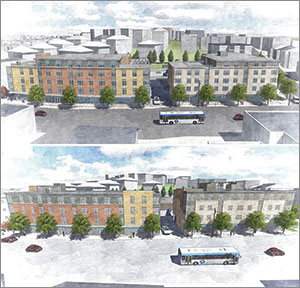 By David R. Smith
By David R. Smith
The Planning Board is poised to approve a scaled-down project in Union Square after abutters appealed the original proposal’s approval this past July.
The two properties being developed jointly between the Somerville Community Corporation (SSC) and a private developer are at 181 and 197 Washington St. Both buildings currently at each site will be demolished to make room for a mix of commercial/retail space along with market-rate and affordable residential units.
Representing the applicant (CPI-SSC, LLC), attorney Adam Dash presented the revised plans at the board’s Feb. 20 meeting.
“We’ve made a lot of progress with the neighbors,” he said, noting they had a neighborhood meeting with abutters and Ward 3 Aldermen Bob McWatters prior to coming back before the board last week.
The revised plans are part of the land court settlement agreement that, according to both sides, is all but finalized.
The original proposal was for a combined 84 housing units and retail/commercial space in two five-story buildings. The proposal approved this past summer was for 74 units. The current plans have reduced that number to 65 units in two four-story building. Because there are fewer units, there is also less parking, eliminating the need for a parking deck included in the original plans. Parking is now in the rear of the buildings and accessed exclusively off of Washington Street.
The 181 Washington St. property, which will be where SCC builds its 35 one- to three-bedroom affordable housing units, was last used as the Somerville Boys and Girls Club, which closed in 2010. Prior to that, it was the Charles G. Pope School and had also served as the home of the school department. The 197 Washington St. property, where what is being called the “CPI building” will be built, is currently home to the Cota-Struzziero Funeral Home.
The reduction in the overall scale of each building did more than just reduce the total number of units. The first floor of the SCC building, which the organization planned to use as its own office space, will now be used for three of the 35 apartments. Dash said the SCC needed to maintain the original number of units to secure grant funding for the project.
The 30 one- and two-bedroom units in the CPI building, four of which will be earmarked as affordable under the city’s inclusionary zoning bylaw, will be sold as condos and not managed as rental apartments as first proposed, a move, Dash said, necessary to make the scaled-down project economically feasible.
The materials and aesthetics of the buildings will be maintained in the new design.
More than one person in attendance, although supportive of the project, said it was unfortunate the changes only came about through legal action.
“I find it hard to believe – in fact, I don’t believe – you didn’t come to us with this project six months ago,” Planning Board member Michael Capuano told Dash.
“We’re not in love with this,” Dash responded. “It’s a different economic model. It’s not what they wanted to do.”
“It’s really tragic that it’s taken this process to get to this point,” Boston Street resident Timothy Talun said.
Another resident echoed that remark.
“I don’t want my neighbors to feel they have to bring a lawsuit to things done,” he said.
And it wasn’t just the abutters who felt that way.
“We need to find a way to get it done before it gets to this,” Planning Board member Joe Favaloro said.
Despite the feelings about how the revisions came about, abutters stressed they were happy with the end results.
“This has been responsibly developed,” Cherry Street resident Frank Berman said. “This has been a responsible response to the concerns, and the longer we wait, the more expensive it gets.”
Stone Street resident Stuart Dash added that what abutters to this project achieved should serve as an inspiration to others.
“I’m very happy to see these changes,” he said. “I look forward to the scale of this project setting a precedent.”
As of last week’s meeting, the settlement agreement had not been finalized, leading the board to ask Dash if the project could be held off until its next meeting. While he said it could, he also expressed concern should the meeting be cancelled and rescheduled, as many city meetings have been postponed this winter due to the weather.
“It’s not a death knell,” he said, “as long as (the meeting) happens.”
Not wanting to vote before the settlement was finalized, the board voted to continue the hearing to March 6.
“We’ve come this far,” Planning Board member Elizabeth Moroney said. “Let’s not end on a bad note.”












Reader Comments